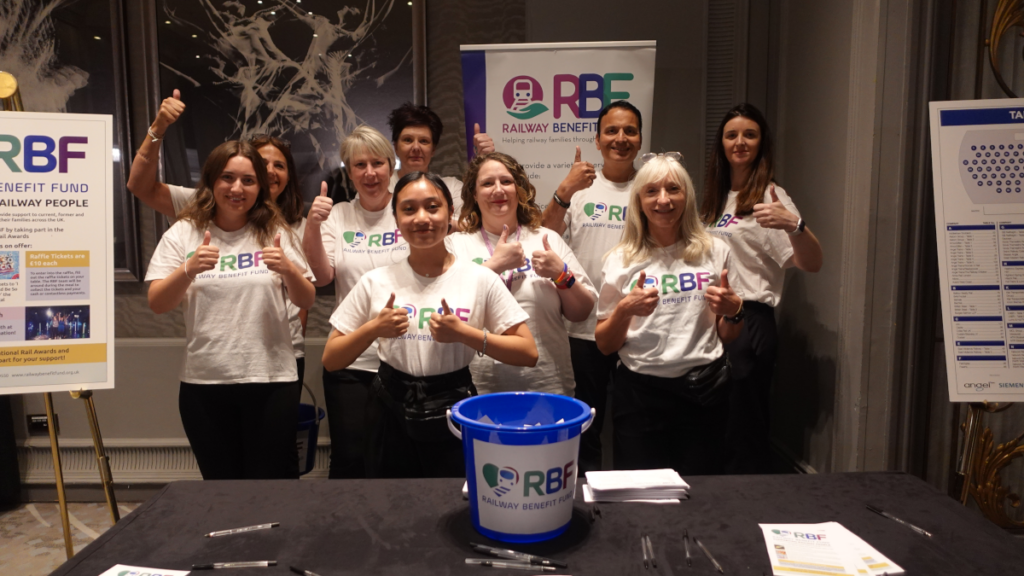Jo Kaye was appointed CEO of Railway Benefit Fund (RBF) in September last year after a lengthy career in rail leadership. RailStaff caught up with Jo to discuss how she came to lead RBF, and the challenges of the current economic climate.
Hi Jo, thanks for joining us. Would you mind giving us a brief overview of your career to date and your journey to becoming CEO of RBF?
Before joining RBF, I worked for nearly 25 years with Network Rail and its predecessor organisations, where I worked in all kinds of roles but mainly frontline operational management. In the early days I worked predominantly in East Anglia and then came up to the North West where I was involved in the West Coast route modernisation project and looked after the region that is now Northwestern Central.
My most recent role at Network Rail was in strategy – strategic planning for the future and timetable planning. I left Network Rail in 2019 and worked in some non-exec and voluntary roles. When I saw the opportunity at RBF, it seemed like a perfect fit for me – a fantastic charity in the industry that I love.
You’ve worked with charitable organisations before – could you give us some background on that?
I’m currently a trustee with an educational charity – a multi-Academy trust, I’m a volunteer first aider with St. John Ambulance, and, during the pandemic, I was a volunteer vaccinator. All of that has given me different understanding of the relationship between the voluntary sector and bodies like the NHS. These opportunities have broadened my knowledge outside of the railway industry, and given me an understanding of other important public services including education and health.
As CEO of RBF, what challenges are you currently seeing among railway staff?
We’ve seen a huge increase in demand for our services over the last few years. Most of our services are around financial support, whether that’s direct financial support via grants to people in need, or providing advice and guidance to people about how to manage their financial issues and prevent them falling into crisis.

There are many reasons behind this uptick in demand. Fuel and food prices have rocketed over the past couple of years, and this cost-of-living crisis is impacting rail industry employees. Many people in the general public believe that rail industry roles are very well paid and that employees are buffered from rising costs, but that is not the reality of the situation.
Every day, our services deal with people who are in financial distress through no fault of their own. That’s despite having a full-time job in the rail industry. Five or so years ago, much of our support went to retired members of the railway, but we’re now supporting more current rail workers than ever.
I’d like the whole of the industry to think about that, because we’re not just here to support those who worked for us in the past. You can be working full-time but still find yourself in difficulty.
The winter months are always a tough time for those facing financial difficulties. How is RBF helping during this period?
As well as financial hardship, the other thing that comes into focus at this time of year is loneliness. One of the services we’ve recently started is ‘Check in and Chat’, which is a befriending service for people who’ve worked in the rail industry. We talk a lot about the railway being a family and I absolutely believe that’s true. Sometimes, when people leave the industry, they can really lose that sense of family and loneliness can become a big problem.
Check in and Chat matches up volunteers with people who would benefit from regular contact and encourages them to arrange regular phone calls between themselves. In the winter months, when it gets dark outside early and the weather can be bad, retired people sometimes find that lots of their usual activities become more difficult. Check in and Chat gives them a chance to talk to someone from the rail family, and a lot of our volunteers have reflected on what fantastic conversations they’ve had.
This service is so important for us as it shows that we’re more than just a provider of financial support. Loneliness is a huge problem and it’s a real shame that people should feel forgotten about, particularly at this time of year.

Regarding the subject of loneliness, how does RBF become aware of people who are dealing with this problem?
Sometimes it becomes apparent when people contact us for financial support, but we also do a great deal of research on the subject. We run social events for the retired community and a lot of the feedback we get is that people really enjoy themselves because it gets them out of the house and gives the opportunity to meet up with likeminded people. The issue of loneliness comes up time and time again and that prompted us to really think about how we can help. Check in and Chat is having a real positive impact and it’s something that our volunteers can do from anywhere in the country without having to give up a huge amount of time. It’s certainly providing a real benefit to those who are feeling a bit forgotten.
It seems unlikely that the UK’s economic situation will significantly improve any time soon. With that in mind, what sort of problems do you expect to see in the coming months?
We are expecting demand for our services to remain high. There doesn’t seem to be any light at the end of the tunnel in terms of the economic situation and, as we all know, while some people are able to manage for a while in difficult circumstances, eventually their resources can run out. We could see demand for financial support increase, and we are planning for that. That’s also one reason why we’re continuing to have as many conversations as we can with industry, driving home the importance of supporting us.
The only money that we receive to help others is raised through fundraising of one sort or another, be that corporate partnerships or individual donations, and we need to continue to encourage as many people as possible in the industry to support us. Ultimately, the money that we receive goes straight back out to support members of the railway family, and that’s so important for people to recognise. We are planning for a busy 2024 of fundraising, with Railway Family Week taking place from 22 April as a key focus for the whole industry and its partners.
Our broader message is really one of encouraging people to think about whether or not they could support us on a regular basis. Having an increased regular income through, for example, individual giving would be hugely beneficial to us and enable us to plan our services for the longer term. There are lots of ways of doing that and it doesn’t have to be anything more than a couple of pounds a month. That money is going to be spent on other people within the rail industry and it will not go anywhere else.
Finally, what advice can you give to somebody who is currently facing financial difficulties at the moment?
I’d say two things. First, don’t put your head in the sand. Quite a few of the cases that we see involve problems that have been going on for some time. One thing I know is that these problems will not go away by being ignored. Second, pick up the phone. There are lots of organisations you can contact, including Citizens Advice, but you must make the decision to get in touch. The sooner you do that, the easier it will be to manage the problems that are on the decks. Take action as soon as the problem arises. Please don’t ignore it.
Contact
Email: [email protected]
Tel: 0345 241 2885
To get involved with fundraising or volunteering, visit www.railwaybenefitfund.org.uk
Image credit: RBF

